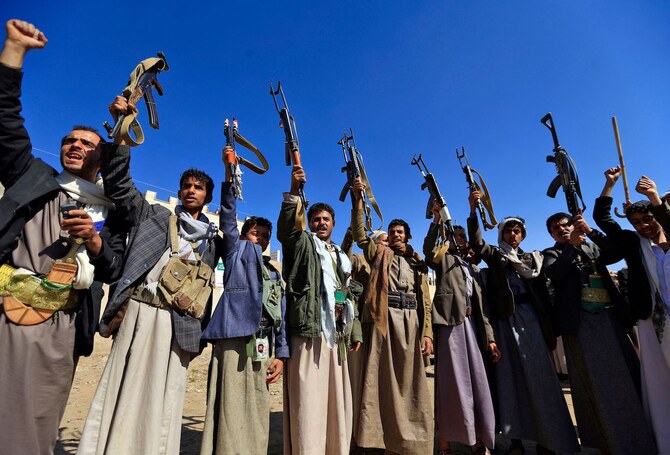AL-MUKALLA: Yemen’s Houthis have abducted dozens of Yemenis in the past 48 hours, the latest in a series of mass arrests in areas under their control for commemorating the 1962 revolution.
Local media and activists on Sunday said that those abducted included academics, politicians and journalists in Sanaa, Dhamar, Hodeida and Taiz for celebrating or inciting the public to celebrate the 62nd anniversary of the 1962 revolution on Sept. 26.
According to Faisal Al-Shabebi, a Yemeni journalist from the former ruling party, the General People’s Congress, the Houthis abducted at least three senior members of the party in the province of Dhamar, including the head of the party’s provincial office, Abdul Khaleq Al-Munejar, and Fuad Al-Nahari, a journalist, among others, over their revolution celebrations.
The crackdown in Dhamar comes as other Houthis stormed houses and gatherings in Sanaa, Taiz, Hodeidah and Ibb and abducted Yemenis who were celebrating the revolution or had expressed their intention to celebrate revolution day on Thursday.
“These arrests by the Houthi militia are part of their miserable attempts to suppress free people who reject their racist sectarian ideology, obliterate the immortal revolution of September 26, and terrorize Yemeni society into submission to this gang,” Al-Shabebi said.
The revolution of September 1962 deposed Zaidi imamates in northern Yemen, ending centuries of repressive rule and paving the way for establishing the Yemen Arab Republic.
Yemenis say that the Houthi militia and the imams share the same radical doctrine that limits the rule of Yemen to Hashemite families, and the Houthis seek to revive that ruling.
Abdulrahman Barman, a Yemeni human rights advocate and director of the American Center for Justice, told Arab News that the Houthis abducted a large number of Yemenis in various regions of Dhamar province on Saturday and Sunday and that some of them were abducted for celebrating the revolution or calling on the public to do so as well.
Barman believes the Houthis began their crackdown on the 1962 revolution celebrations days before revolution day to prevent Yemenis from attending large rallies on Thursday.
Raising the Yemen flag and chanting nationalist slogans, Yemenis organized rare large-scale public celebrations of the 1962 revolution in Sanaa and other Houthi-held areas in September last year despite Houthi attempts to disperse them, Barman said.
Yemeni rights groups, including the Musawaah Organization for Human Rights and Freedoms and the Rasd Coalition, condemned the Houthi crackdown on Yemenis celebrating revolution day, urging them to stop arresting people and allow the public to celebrate freely.
This comes as the Geneva-based SAM Organization for Rights and Liberties said in a report released on Saturday, the 10th anniversary of the Houthi military takeover of power, that the Houthis have closed 163 newspapers, magazines and radio stations, as well as blocked 200 websites and arrested or harassed dozens of Yemeni journalists over the past decade.
During that time, the Houthis have detained at least 18,000 Yemenis, including many who have been forcibly disappeared.
Their arbitrary shelling of residential areas in Yemen has killed at least 15,000 civilians and injured more than 34,000, while more than 2 million landmines planted by Yemeni militia in Yemen have killed at least 2,632 people, including 477 children and 168 women, and wounded 3,386, including 730 children and 219 women, according to SAM’s report.
Since September 2014, the Houthis have demolished 713 houses belonging to their opponents and recruited more than 30,000 children.
The Houthis stormed Yemen’s capital Sanaa on Sept. 21, 2014, before spreading across the country, sparking a war that has killed more than 100,000 people, displaced millions, and created the world’s worst humanitarian crisis, according to the UN.
























